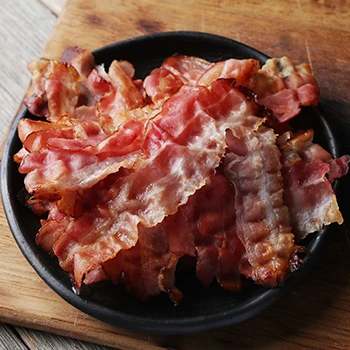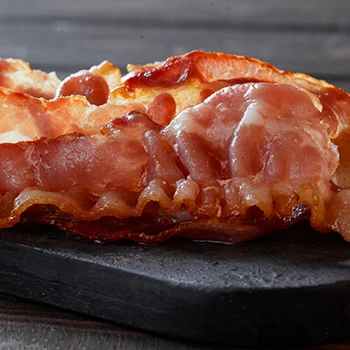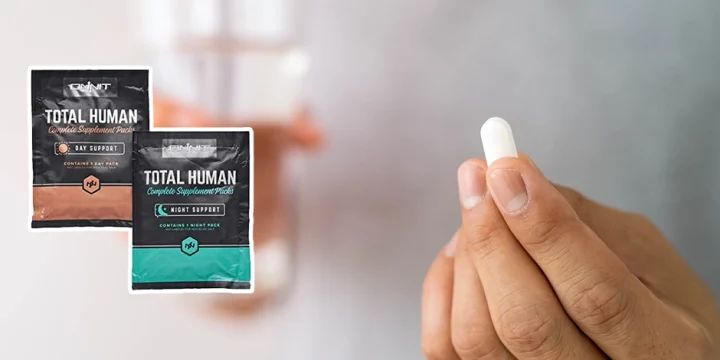Many of my fitness clients come to me with frustrations early on in their new weight loss routine. Often, these conversations focus on giving up foods they love.
Forfeiting bacon is a hot topic for these discussions, so our dietician came on board to help me do thorough research for my clients.
Whether you are trying to lose weight or just curious about bacon and your health, read on to find out what a week of research yielded.
Quick Summary
- Bacon is good for weight loss if consumed in moderation, focusing on portion control and choosing leaner cuts.
- Bacon is high in protein and fat, with a single slice containing about 32 calories, 2.6 grams of protein, and 2.3 grams of total fat.
- The American Heart Association recommends consuming no more than 2500 mg of sodium per day, preferably less than 1500 mg and a single serving of bacon can contain up to a third of the daily limit.
- As a fitness enthusiast, and in my experience, I think bacon can be included in a balanced diet for weight loss, but it's crucial to be mindful of its high sodium and saturated fat content.
Should You Be Eating Bacon When Trying to Lose Fat?

You should be eating bacon when trying to lose fat; you just need not overdo it and be more careful when choosing the cut.
As a fitness enthusiast myself, I've found that opting for leaner cuts like center-cut bacon allows for occasional indulgence without derailing weight loss efforts.
Center-cut bacon can be a great occasional treat that won’t derail your weight loss efforts. Remember, moderation is the key to any healthy diet.
Exercise regularly, consume fewer calories than you expend, and have a diet rich in whole grains, fruits, vegetables, and protein,
Do all this, and an occasional slice (or two) of bacon won’t sabotage your efforts to lose body fat or cause you to gain weight.
Bacon Facts
The USDA gives the following nutrition facts for a single slice, approximately 6.3 grams of cooked, cured bacon [1]:
- Calories: 32
- Protein: 2.6 g
- Total Fat: 2.3 g
- Saturated Fat: 0.79 g
- Carbohydrates: 0.13 g
- Sodium: 115 mg
- Sugar: 0.20 g
How Is Bacon Made?
Bacon is processed meat made from pork and cured in a solution that includes nitrates, salt, and at times, sugar.
Commonly, the next step in the process after curation is smoking. Curating and smoking help preserve the meat and give bacon its distinctive taste [2].
“Uncured bacon is bacon that hasn’t been cured with sodium nitrites. Usually, it’s cured with a form of celery, which contains natural nitrites, along with plain old sea salt and other flavorings like parsley and beet extracts.”
-Natalie Olsen, R.D., L.D., ACSM EP-C.
Is It Nutritious?
Bacon is reasonably nutritious as it is low in carbs and high in protein but should be an occasional treat because of its high sodium and fat content. Let’s take a quick look at the “bad” of bacon.
Bacon Fat

Bacon is high in fat, specifically saturated fat, which is traditionally considered an unhealthy fat that can contribute to heart disease and weight gain.
Our bodies require a certain amount of fat for energy. Still, according to one of the studies from the MedlinePlus website, saturated fat may lead to cholesterol build-up in the arteries [3].
However, there are some metastudies, such as one from the National Center for Biotechnology Information website, that suggest there is no connection between saturated fat consumption and heart disease whatsoever [4].
Following a low-fat diet would likely discourage bacon eating because of the saturated fat content, but as we’ve mentioned, the jury is still out on this one, and our bodies require some for fuel [5].
I always remind my clients that it all comes back to everything in moderation for a healthy lifestyle.
Salt
The American Heart Association (AHA) recommends no more than 2500 mg of sodium but sets an ideal limit of 1500 mg per day, and one serving of bacon can be as much as a third of the amount you should consume over an entire day [6].
Personally, I'm cautious about high-sodium foods like bacon, as they can quickly add up to a significant portion of the daily recommended limit.
Many people consume more sodium than they should, usually from processed food or many restaurant foods, but surprisingly not necessarily from the table shaker.
Too much salt in your diet may cause high blood pressure, which can lead to heart disease or even stroke [7].
In Popular Diets

Countless diets promote their method as the best for losing weight. Finding the right diet that yields the best results can be tricky. Here are a couple of options where bacon isn’t banned.
Keto Diet
The ratio of nutrients consumed in a ketogenic diet should consist of 60–80% fat, 10–30% protein, and no more than 5–10% carbs per day [8].
The Keto diet is one of the low-carb diets for weight loss that focus on meat, vegetables, and dairy, which have fewer carbohydrates and high protein while including sugar-free beverages. On this diet, you should limit highly processed foods, but that doesn’t mean you can’t enjoy bacon occasionally.
Intermittent Fasting
Intermittent fasting is a trending diet regimen that cycles between periods of food abstinence and unrestricted eating. There is some flexibility in the schedule from hours to alternating days or more extended periods [9].
Although intermittent fasting has its benefits, speaking to your doctor and dietitian to evaluate what is best for your overall health before implementing a fasting schedule is the best practice.
FAQs
Is Crispy Bacon Healthier?
Crispy bacon might be healthier because the fat melts (renders) during the cooking process, so the overall fat content of the piece decreases. Cook until crisp but not burnt to reduce calories and fat and the potential for weight gain.
Is There Healthy Bacon?
There is healthier bacon out there; you just need to know what to look for; uncured, center-cut, low-sodium, or turkey bacon are all better options.
What Are the Nutritional Differences Between Various Types of Bacon?
Different types of bacon, such as turkey, pork, and Canadian bacon, vary in their fat and protein content. For instance, turkey bacon generally has less fat than pork bacon, while Canadian bacon is leaner and lower in calories, making it a potentially better option for weight loss.
How Does Bacon Fit into Ketogenic and Low-Carb Diets?
In ketogenic and other low-carb diets, bacon is often a favored choice due to its high fat and moderate protein content, which aligns with the macronutrient requirements of these diets. Its satiating properties can help maintain the state of ketosis, which is crucial for the success of these diets.
Does the Cooking Method Affect the Healthiness of Bacon?
The cooking method can significantly impact the healthiness of bacon; for example, baking or grilling can reduce its fat content compared to frying. Choosing healthier cooking methods can make bacon a more suitable option for those conscious about fat intake and calorie count.
Can Bacon's High Protein and Fat Content Help with Appetite Control?
The high protein and fat content in bacon can contribute to increased satiety, helping to control appetite and reduce overall calorie intake. This makes bacon a potentially useful food for weight loss, as long as it's consumed in moderation and as part of a balanced diet.
How Can Bacon Be Incorporated into a Balanced Diet for Weight Loss?
Bacon can be included in a weight loss diet by monitoring portion sizes and pairing it with nutrient-dense foods like vegetables and whole grains. This approach allows for the enjoyment of bacon while ensuring the overall diet remains balanced and conducive to weight loss.
References:
- https://fdc.nal.usda.gov/fdc-app.html
- https://www.healthline.com/nutrition/is-bacon-bad-or-good
- https://medlineplus.gov/ency/patientinstructions/000838.htm
- https://www.ncbi.nlm.nih.gov/pmc/articles/PMC2824152/
- https://www.verywellhealth.com/low-fat-diets-and-the-heart-1746349
- https://www.heart.org/en/healthy-living/healthy-eating/eat-smart/sodium/how-much-sodium-should-i-eat-per-day
- https://www.bloodpressureuk.org/your-blood-pressure/how-to-lower-your-blood-pressure/healthy-eating/salt-and-your-blood-pressure/
- https://www.healthline.com/nutrition/keto-diet-meal-plan-and-menu
- https://www.hsph.harvard.edu/nutritionsource/healthy-weight/diet-reviews/intermittent-fasting/
About The Author
You May Also Like






